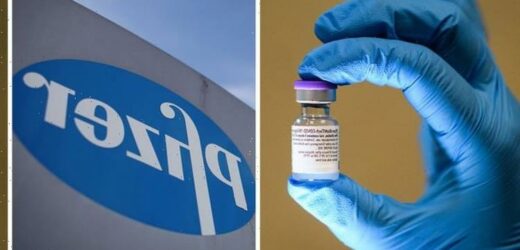Omicron: Dr Amir talks through the symptoms of the new strain
We use your sign-up to provide content in ways you’ve consented to and to improve our understanding of you. This may include adverts from us and 3rd parties based on our understanding. You can unsubscribe at any time. More info
It showed that two doses of the COVID-19 vaccines offered around 70 percent protection during a recent surge in Omicron cases in South Africa. That is a drop from around 92 percent in a previous Delta wave, according to South Africa’s Medical Research Council. The preliminary study, which has not yet been formally published, is the first real-world insight into how much protection COVID-19 vaccines may offer against Omicron.
It found that the vaccine protected all age groups, but at different levels.
The highest 92 percent – was in 18 to 29-year-olds, down to 59 percent protection in 70 to 79-year-olds.
Glenda Gray, president of the South African Medical Research Council, said that boosters “will help” with the possible reduction in protection against hospitalisations.
But the experts did warn that the results may change as the study assumed 78,000 of 211,000 lab test results from November 15 and December 7 were Omicron but didn’t confirm it.


South African health officials said on December 2 that Omicron accounted for 70 percent of sequenced COVID-19 cases in the country in November.
Simon Clarke, associate professor in Cellular Microbiology at the University of Reading, said:
“It shouldn’t be forgotten that in the UK there was a five-week gap between the first diagnosis and the first death.”
Early studies on Pfizer’s vaccine, from various labs worldwide, have already found a 20 to 40 fold reduction in antibody response against Omicron versus other variants.
It was not clear from the experiments how well the vaccine would perform in real-life especially against severe disease, which relies on other components of the immune system, called T-cells and memory cells, rather than antibodies.
Antibodies stop the initial infection and then T cells and memory cells stop you from getting sick or dying, although a few people will inevitably become severely unwell from the virus.

The South African researchers said that Pfizer’s vaccine was 33 percent effective against infection during the Omicron wave compared with 80 percent in the Delta surge.
Antibodies are the first line of defence against infection, so the reduction in protection could be in keeping with the lab studies.
But data published on Friday also found that, after a booster, Pfizer’s vaccine was 70 percent to 75 percent effective against symptomatic COVID-19 caused by Omicron.
Health workers are gearing up to vaccinate 1.2 million people a day in the UK.


Chris Hopson, the chief executive of NHS Providers, said: “The NHS is already under enormous pressure, and scaling up in this way will be a huge challenge.
“GPs didn’t know about this in advance,” said Beccy Baird, a senior fellow at the King’s Fund think tank.
“Nobody is saying they won’t do it. I think they will throw everything at it.
My WhatsApp has been exploding with planning messages from around the country.”
Source: Read Full Article


